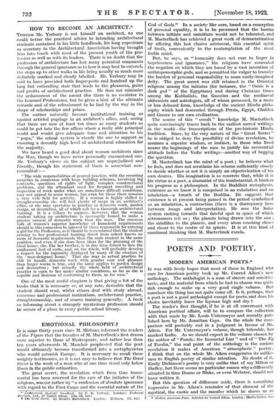EMOTIONAL PHILOSOPHY.t IT is some thirty years since M. Mirbeau
informed the readers of the Figaro that the beauties of M. Maeterlinck's first drama were superior to those of Shakespeare, and rather less than ten years afterwards M. Mauclair prophesied that the poet would ultimately become transformed into a metaphysician who would astonish Europe. It is necessary to recall these weighty testimonies, as it is not easy to believe that The Great Secret is the work of a man who at one time stood only below Ibsen In the public estimation.
The great secret, the revelation which from time imme- morial has been reserved for the ears of the initiates of the religions, was (or rather is) "a confession of absolute ignorance with regard to the First Cause and the essential nature of the Areltitectural Students' Handbook. By F. B. Yerbury. London: Technical Journals, Ltd, 27 Totbill Street. [10e. 64. net] Tiadt Great Sexist. By Maurice Maeterlinck. London : Methuen. I% 65.1 God of Gods." In a society like ours, based on a conception of personal equality, it is to be presumed that the barrier
between initiate and uninitiate would not be tolerated, and M. Maeterlinck has achieved a great work of democratization by offering this last elusive aristocrat, this essential spirit of truth, conveniently to the contemplation of the most feeble mind.
But, he says, as " humanity does not care to linger in hopelessness and ignorance," the religions have concealed the negation on which they are based by a vast invention of anthropomorphic gods, and so permitted the vulgar to transfer the burden of personal responsibility to some easily-imagined deity. The great secret was still retained in the Oriental religions among the initiates (for instance, the " Osiris is a dark god " of the Egyptians) and during Christian times among the Kabbalists, the Gnostics and the mediaeval alchemists and astrologers, all of whom possessed, in a more or less debased form, knowledge of the ancient Hindu philo- sophy which had descended through Persia, Egypt, Chaldea and Greece to our own civilization.
The source of this " occult " knowledge M. Maeterlinck quite convincingly traces back to the earliest sacred writings in the world—the transcriptions of the pre-historic Hindu tradition. Since, by the very nature of the " Great Secret " he is obliged to deny the possibility of divine revelation, he assumes a superior wisdom, or instinct, in those who lived nearer the beginnings of the race to justify his reverential attitude before the Vedic writings—another way of begging the question.
M. Maeterlinck has the mind of a poet ; he believes what he feels, and does not scrutinize his scheme sufficiently closely to decide whether or not it is simply an objectivication of his own desires. His imagination is so concrete that, while it is his virtue as a poet, a dramatist of the insubstantial, it hinders his progress as a philosopher. In the Buddhist metaphysic, existence as we know it is comprised in an exhalation and an inhalation—a breath of the Buddha. He suggests that existence is at present being passed in the period symbolized as an inhalation, a contraction (there is a discrepancy here between image and interpretation). He sees the Solar system rushing towards that fateful spot in space of which astronomers tell us ; the planets being drawn into the sun ; the satellites to the planets, and every atom crushing closer and closer to the centre of its sphere. It is at this kind of emotional thinking that M. Maeterlinck excels.






































 Previous page
Previous page